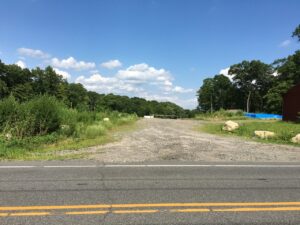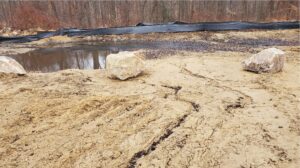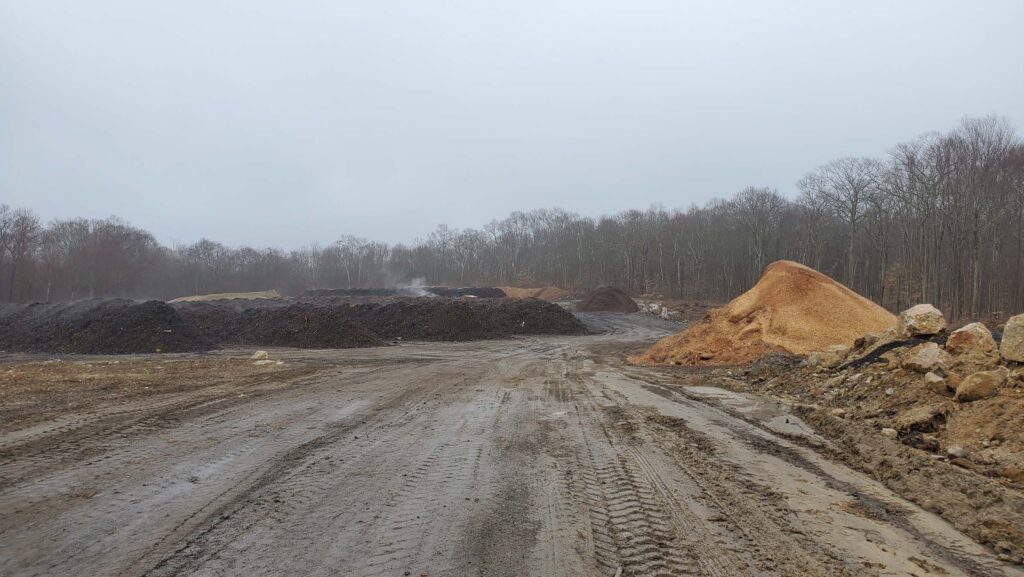
The Bethlehem Inland Wetlands and Watercourses Agency on July 27 denied an application submitted by Grillo Services, LLC for an organic composting facility and construction & demolition debris transfer station on property located at 351 Main St. South.
The denial closely reflects issues, concerns, and violations cited by experts retained by Cramer & Anderson and the firm’s client, adjacent property owner and intervenor Ronald L. Bridge.
Partners Dan Casagrande and John Tower, who together are highly-experienced in municipal, land-use, and environmental law, submitted two petitions for intervenor status on behalf of Bridge, one to address the regulated activities proposed by Grillo Services LLC, and the other concerning Grillo’s application to implement an interim stabilization soil erosion and sedimentation control plan.
The petitions explain that watercourses passing through the Grillo Property flow onto and through the Bridge Property, and both are tributaries of a high-quality trout stream with a total watershed area of 5.85 square miles that passes through the Bridge Property and feeds directly into the Nonnewaug River, which is part of the watershed providing drinking water for Watertown.
One of the watercourses emerges from wetlands the Grillo plan would have encircled with industrial and commercial uses, and all of the regulated activities would have occurred immediately up-gradient from the Bridge property.

Rills to a makeshift sediment basin in a March 2021 photo included in exhibits presented to the wetlands agency
“Grillo has intentionally caused a large number of inland wetlands violations that severely impact complicated inland wetland, watercourse, and watershed systems,” the petition concerning the interim stabilization plan said of activities that have already occurred on the property.
The petition explained that, in addition to Grillo’s unpermitted activities having a “significant impact,” Grillo’s proposed excavation of 185 cubic yards of material from wetland areas, 5,000 cubic yards of soils from upland-review areas, and undetermined amounts of fill from areas outside of wetlands and upland-review areas “will necessarily and inextricably cause or are likely to cause significant impact” to watercourses and wetlands.
As an intervenor, Bridge also alleged that the activities proposed in the application have, or are reasonably likely to have, the effect of unreasonably polluting, impairing or destroying the public trust in the air, water or other natural resources of the State of Connecticut.
The wetlands agency agreed with the evidence and arguments presented by Cramer & Anderson and the intervenor’s experts in denying in its entirety the application to regrade and develop the site for use as organic composting facility and transfer station for construction & demolition (“C&D”) waste proposed to be trucked into the property from demolition projects elsewhere.
According to the final decision approved in a July 27 meeting, the wetlands agency found Grillo’s proposed activities “…are reasonably likely to have the effect of unreasonably polluting, impairing or destroying the public trust in the air, water or other natural resources of the state.”
That judgment was underlined and emphasized in bold for these reasons, the agency said:
- Impact of likely thermal pollution and composting leachate on water resources and the public water supply, and lack of sufficient data to alleviate this concern.
- Lack of information regarding potential effects of proposed construction & demolition (C&D) debris recycling operation on water resources and public water supply.
- Presence of feasible and prudent alternatives that would alleviate the above concerns.
“The Agency has identified feasible and prudent alternatives in this decision,” the draft decision said. “The Intervenor’s consultants also put forward several alternatives that the Agency finds feasible and prudent.
The existence of feasible and prudent alternatives, and the lack of necessary information, were cited as additional reasons for the wetlands agency’s denial. These included:
- Lack of Necessary Information for the Agency’s Evaluation of Phase III.
- Feasible & Prudent Alternatives Present in Phase III.
- Lack of Necessary Information for the Agency’s Evaluation of Phase II.
- Feasible & Prudent Alternatives Present in Phase II.
- The Presence of Feasible and Prudent Alternatives for the Access to and/or Location of the Proposed Retail Area in Phase I.
- The Presence of Feasible and Prudent Alternatives for the Construction & Demolition Debris Recycling Facility in Phase I.
- The Presence of Feasible and Prudent Alternatives for the Use of the Entire Site.
- The Application does not include the requirements of the Interim Stabilization Plan Approved September 24, 2021.
“It was an honor to represent our clients in opposing a project that would have detrimentally impacted important wetlands and watercourses, and I appreciate the expertise and hard work that our multi-disciplinary experts brought to the table,” Attorney Tower said.
“The Bethlehem wetlands agency deserves great credit for listening to and weighing all the evidence in issuing a detailed decision on a complicated proposal,” Attorney Casagrande said. “Attorney Tower did a magnificent job in persuading the agency as to the serious damage to the environment that Grillo’s ongoing and proposed actions have caused and will cause.”
Cramer & Anderson’s attorneys have decades of experience in Municipal Law, Land Use & Environmental Law, and Planning & Zoning Land Use. We provide sophisticated legal services to municipalities and municipal agencies, as well applicants appearing before municipal regulatory agencies, and citizens and property owners concerned about the impact of proposed projects.
Our interdisciplinary approach allows us to combine forces, bringing in colleagues from other disciplines as a way to keep costs down and avoid unnecessary billable hours.
The firm has six regional offices serving all of western Connecticut, including a flagship location in New Milford, primary offices in Litchfield and Danbury, and satellite offices in Washington Depot and Kent. Our newest office in Ridgefield is positioned conveniently for clients in Fairfield County. To learn more, see the website or call us at (860) 355-2631.

Leaf windrows on the property in March 2021 photo included in exhibits presented to the wetlands agency

